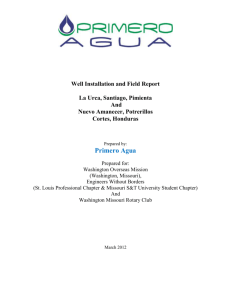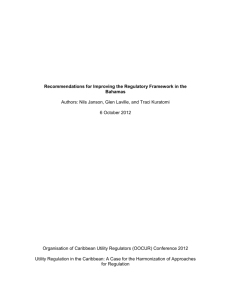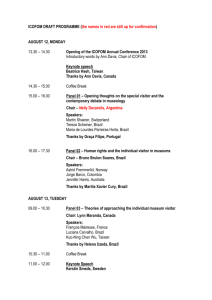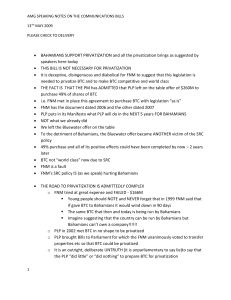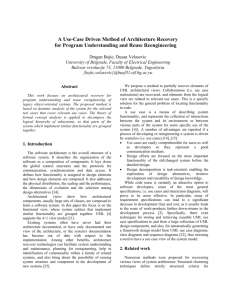ITU Case Study The Creation of the Utilities Regulation and Competition Authority of The Bahamas
advertisement
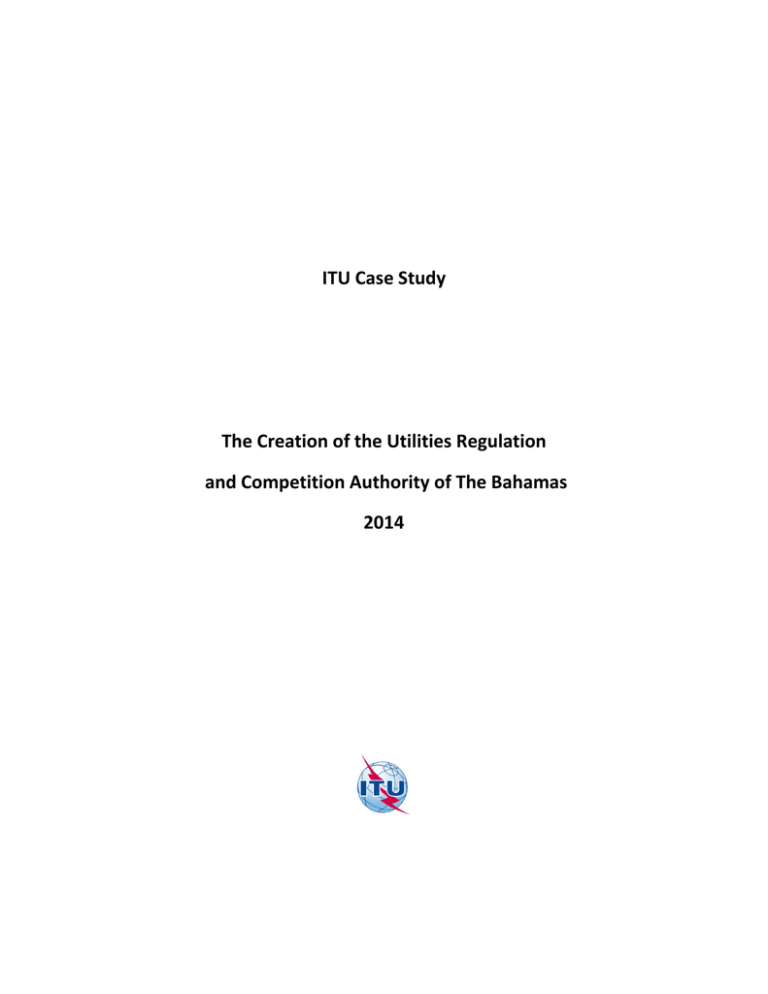
ITU Case Study The Creation of the Utilities Regulation and Competition Authority of The Bahamas 2014 This case study was prepared by Daniel Leza, Vice President, Legal and Regulatory of Telecommunications Management Group. The author wishes to thank Ms. Kathleen Riviere‐Smith, Chief Executive Officer of the Utilities Regulation and Competition Authority (URCA) of The Bahamas for her assistance in the preparation of this report; Ms. Nancy Sundberg, Telecommunications Development Bureau, ITU, for support in preparing this report and Allen Gibby for research assistance. The views expressed in this paper are those of the author and do not necessarily reflect the views of the ITU or its members. 2 Contents 1. Introduction ............................................................................................................................ 4 2. Background to the 2009 regulatory reform initiative and the creation of URCA .................. 5 3. 2.1 Operators active in the market in 2009 ........................................................................... 5 2.2 Institutional structures preceding URCA .......................................................................... 5 2.3 Drivers to the reforms leading to the creation of URCA .................................................. 6 Creation of URCA: mandate and powers ................................................................................ 7 3.1 Transition from the PUC to URCA .................................................................................... 7 3.2 Principles governing URCA’s actions .............................................................................. 10 3.3 Scope of URCA’s mandate and responsibilities ............................................................. 12 4. Privatization of BTC and liberalization of the mobile cellular market .................................. 17 5. Role of URCA in the regulation of privacy and data protection ........................................... 18 6. Role of URCA in stimulating broadband uptake and fostering innovation in applications and services .......................................................................................................................................... 19 7. Conclusions ........................................................................................................................... 20 3 1. Introduction The object of this case study is to review the electronic communications and broadcasting sector reform that led to the creation of the Utilities Regulation and Competition Authority (URCA) in The Bahamas. The overall goals of the reform were two‐fold: (i) to fully liberalize the electronic communications sector through the introduction of competition in various market segments, including the mobile and cable television services markets and (ii) to privatize the state‐owned incumbent provider, Bahamas Telecommunications Company (BTC), to attract investment and further development in the electronic communications sector. The reform process was launched with the passage of two key legal instruments, the Utilities Regulation and Competition Authority Act of 2009 (URCA Act) and the Communications Act of 2009. These laws created the regulatory underpinnings for the liberalization and privatization process and established URCA, an independent, multi‐sector regulator, initially tasked with overseeing the electronic communications and broadcasting sectors and enforcing competition law in these sectors. Since the laws were passed, all market segments, with the exception of mobile services, have been opened to competition. Over the past four years, URCA has adopted a series of regulatory decisions preceded designed to protect consumers and create a pro‐competitive environment. These have included, for example, the licensing of competitive providers in most market segments, the adoption of asymmetric regulations for operator found to have significant market power, including interconnection and access obligations, the adoption of codes of conduct and competition guidelines, among others. In addition, BTC was privatized in 2011, with the sale of 51 percent control to Cable & Wireless Communications (CWC). Despite this progress, however, the reform process is not concluded, with two key milestones yet to be achieved. The first, and perhaps the most critical step in the process, is the liberalization of the mobile market, following the termination of CWC’s legal monopoly on April 6, 2014. This is expected to take place in 2015. The second, is the formal expansion of URCA’s oversight role to include other network industries, such as electricity and water. Specific legislative discussions to assign URCA responsibilities over other sectors are ongoing and are expected to result in a revision URCA’s structure and mandate. This case study examines the background and key drivers of the 2009 sector reforms that led to the creation of URCA, and reviews the scope of URCA’s mandate and powers in the areas of electronic communications, broadcasting and competition law enforcement. It also addresses the BTC privatization process, the upcoming liberalization of the mobile cellular market, and URCA’s role in promoting broadband availability and take‐up in The Bahamas, as well as its role in the regulation of privacy and data protection. 4 2. Background to the 2009 regulatory reform initiative and the creation of URCA 2.1 Operators active in the market in 2009 In 2009, the electronic communications market in The Bahamas was partially liberalized. All services, with the exception of mobile services and cable television were formally open to competition. There was limited competition in the market for fixed telephony services, with state‐owned Bahamas Telecommunications Company (BTC) and Systems Resources Group (SRG) licensed to provide service to the Bahamian public, including international, inter‐island and local calling services.1 Several entities were licensed to offer Internet service, but BTC and Cable Bahamas Ltd. (CBL) were the main broadband providers, with a combined market share of around 95 percent of the market.2 BTC provided DSL service over its copper network, while BTC offered cable‐ modem connections over a hybrid fiber‐coaxial network. At the time, mobile services were provided by BTC under a legal monopoly, which remained in force until April 2014.3 There was only one cable television provider, CBL, active in the country, which was operating according to an exclusive franchise it obtained in 1994 to establish, maintain and operate a cable television system throughout The Bahamas (exclusive of Freeport, Grand Bahama) for a period of fifteen (15) years. The exclusivity period expired October 13, 2009. 2.2 Institutional structures preceding URCA Prior to the sector reform process launched in 2009, the task of regulating electronic communications in The Bahamas was shared between a number of authorities, which led to inconsistent decisions and regulatory uncertainty.4 The two authorities with responsibilities in the sector at the time were the Public Utilities Commission (PUC) and the Television Regulatory Authority (TRA), which were responsible for overseeing the telecommunications and broadcasting sectors, respectively. 1 See URCA, Three Year Strategy & Annual Plan for 2009‐2010, Draft for Comments, 30 December 2009, at 2 available at http://www.urcabahamas.bs/download/026656300.pdf. Note that Cable Bahamas Limited (CBL) acquired SRG in 2011. See URCA, Merger Control Adjudication, Systems and Cable Bahamas, 01/2011, at § 1.1‐1.4. 2 Id. at 4. 3 See Communications Act, as amended, art. 114. 4 Office of the Prime Minister, Electronic Communications Policy, Oct. 7, 2009, paras. 27 available at http://www.urcabahamas.bs/download/028537000.pdf. 5 The PUC was organized as a multi‐sector regulator, and was charged with regulating state‐ owned utilities, including electricity, telecommunications, water and gas. It was responsible for ensuring that the services rendered by such utilities were satisfactory and that the charges to consumers were reasonable.5 It was also charged with promoting the interests of consumers, and promoting effective competition, in accordance with government policy, for the various sectors.6 The PUC’s annual budget was approved by the Prime Minister.7 TRA was nominally responsible, on behalf of the Prime Minister, to oversee cable television licensees, to approve rates charged to subscribers, to make recommendations to the Minister regarding the issuance, suspension, and revocation of licenses, and to make recommendations to the Minister regarding regulations.8 In practice, however, the TRA was never formally constituted and was not in operation at the time of the reform. 2.3 Drivers to the reforms leading to the creation of URCA The key drivers for electronic communications and broadcasting sector reform in The Bahamas have much in common with similar initiatives undertaken by other countries in the Caribbean region and around the world. The Bahamian government observed that electronic communications networks and services, which it considered to be an essential part of supporting the commercial and social progress of the Bahamian economy, were not meeting the county’s demands and were unlikely to meet them in future.9 Specifically the government found that the lack of competition had resulted in high retail prices for non‐liberalized market segments, low quality and limited choice.10 In the case of prepaid mobile service, for instance, prices in the Bahamas were 2.7 times the average of regional peer countries, while postpaid prices were 2.3 time the regional average.11 Similarly, the government found that meeting 5 Public Utilities Commission Act, art 4. 6 Id. 7 Id. art. 7(1)‐(2). 8 Television Regulatory Authority, Ch. 307‐1, art. 4. 9 Electronic Communications Policy, paras. 1, 5. 10 At the time, the Prime Minister noted that “BTC customers also continue to pay one of the highest prices in the region to purchase phones. If BTC does not deliver good service to its customers, or takes several months to provide a connection, Bahamian customers today have no choice and have to live with this.” See Communication by Rt. Hon. Hubert A. Ingraham On the Sale of 51% of Bahamas Telecommunications Company To Cable & Wireless Communications, Plc. (CWC), Feb. 8, 2011, at 18, available at http://www.bahamas.gov.bs/wps/wcm/connect/mof_content/internet/all%20pdfs/resources/the%20prime%20m inister%20address%20on%20btc%20sale. 11 Regional average includes Barbados, Cayman Islands, Jamaica, Panama, and St. Lucia. See id., at 6. 6 projected demand for services would entail substantial investment in infrastructure to establish and deliver services to individuals and commercial users.12 BTC, a government‐owned entity could not undertake these investments alone and hence required additional private participation in the sector. Given these circumstances, the government determined that a critical precondition to achieving a well functioning and innovative sector was to liberalize and promote competition in the market for electronic communications services.13 To accomplish this, the Prime Minister set out a series of guidelines to ensure that a regulatory authority would be set up in order to usher in competition in the various markets were it had not already taken hold. Another important part of the liberalization process would be the privatization of BTC and the separation of the government’s regulatory authority from its operational involvement over BTC.14 The Bahamian government also recognized that the convergence between previously distinct services and networks required reforms in how the sector was regulated.15 As a response, a converged regulatory framework was adopted to be overseen by a converged regulatory and competition authority.16 3. Creation of URCA: mandate and powers 3.1 Transition from the PUC to URCA When the URCA Act entered into force on August 1, 2009, the PUC and TRA were formally dissolved,17 and the property and contracts of each of these regulators, together with all their functions and powers, were transferred to URCA.18 The transition from preexisting regulatory authorities to URCA was simplified by the fact that the TRA had in practice not been constituted and was not operating; there was thus no need to merge preexisting organizational structures, processes, human resources, assets, etc. 12 Electronic Communications Policy, para. 9. 13 Id. para. 13. 14 Id. 15 Id. para. 7, available at http://www.urcabahamas.bs/download/028537000.pdf. 16 Id. 17 URCA Act, art. 43(1). 18 Id. art. 43(2). 7 As a result of this transition and the provisions of the URCA Act, the new regulatory authority has been organized according to the structure set forth in Figure 1. Figure 1: URCA’s organizations structure Board Non‐Executive Member Deputy Chairperson Non‐Executive Member Chairperson Non‐Executive Member CEO Executive Member Director of Policy and Regulation Executive CEO Director of Policy and Regulation Consumer & Legal Licensing & Monitoring Information Economics & Regulatory Finance Technical Finance HR & Admin. Source: URCA Table 1 describes the various key positions within URCA’s structure as provided under the URCA Act. Table 1: Description of key positions within URCA’s organizational structure Position Description Board of Directors The Board of Directors is comprised of five members.19 Three members are non‐executive members, among which one serves as Chairperson.20 The other two members are executive members; 19 Id. art. 13. 20 Id. 8 one executive member being the Chief Executive Officer and the other is the Director of Policy and Regulation.21 The Board is responsible to carry out the functions of the Communication Act.22 Non‐Executive Members23 The Governor‐General appoints the three non‐executive members, on advice of the Prime Minister after consultation with the Leader of Opposition.24 Non‐executive members are expected to have expertise in the relevant sectors such as lawyers, economists, or some other type of business background.25 Chairperson The Governor‐General appoints the chairperson, on the advice of the Prime Minister and after consultation with the Leader of the Opposition.26 The Chairperson is responsible for convening the Board for it to carry out its functions.27 Deputy Chairperson The Chairperson appoints one of the other non‐executive members to be the deputy chairperson.28 The deputy chairperson is entitled to carry out the functions of the Chairperson, in accordance with directions given by the Chairperson, and will take on the duties of the Chairperson in his or her absence.29 Chief Executive Officer (CEO) The CEO, appointed by URCA, is responsible to carry out the day to day management of URCA.30 The CEO exercises the powers of 21 Id. 22 Id. art. 12. 23 As URCA’s obligations are extended to sectors other than the electronic communications sector, the number of non‐executive members may be increased to ensure that the other sectors are sufficiently represented at URCA. Id. art. 13(3)(a)‐(b). 24 Id. art. 18(1). 25 Id. art. 18(2)(b)(i)‐(ii). 26 Id. art. 14(1). 27 Id. art. 17(1). 28 Id. art. 15(1). 29 Id. art. 15(2). 30 Id. art. 4(3)(a). 9 URCA delegated to him or her by the Board and is accountable to the Board for the use of such delegated powers.31 The CEO is subject to the supervision of the Board, is to follow directions and recommendations of the board, and may be advised by committees established by URCA.32 Staffing URCA has the authority to appoint officers, employees and agents as it considers necessary for the performance of its functions.33 At the end of 2013 URCA’s staff was comprised of 24 people, which consisted of 12 Policy and Regulation team members and 12 support team members.34 Source: Author, based on URCA Act 3.2 Principles governing URCA’s actions The URCA Act set forth a series of decision‐making and good governance principles to guide URCA’s actions going forward. These principles are designed to ensure URCA functions as an independent regulatory authority, not subject to undue influence from the government or from private stakeholders. In line with international best practices, URCA is subject to principles that ensure its decisions are proportionate, benefit from public input and debate, are published and made known to relevant stakeholders and are adopted only after considering whether the potential benefits of a decision outweighs its potential costs. Similarly, URCA is granted significant independence from a staffing and budgeting perspective; its staff and members are subject to clear conflict of interest requirements and must discharge their duties impartially and in good‐faith. Finally, URCA must publish periodic reports identifying its past regulatory actions, and future plans and priorities (see Box 1). Box 1: Regulatory decision‐making and governance principles guiding URCA actions The URCA Act provides the following regulatory decision‐making and governance principles to guide URCA’s actions: 31 Id. art. 29(1). 32 Id. art. 4(3)(b)‐(c), (e). 33 Id. art. 22. 34 URCA, 2013 Annual Report and Annual Plan 2014, 30 April 2014, at 32, available at http://www.urcabahamas.bs/download/068236100.pdf. 10 Decision‐making Proportionality: All measures adopted by URCA shall be proportionate to their purpose and introduced in a manner that is transparent, fair and non‐discriminatory.35 Public consultation: URCA must allow interested persons a reasonable opportunity to comment on proposed measures of public significance, and must give due regard to such comments.36 Transparency: URCA must make available to the public its regulatory decisions and other matters of public significance, notwithstanding the duty to ensure confidentiality of commercially sensitive information.37 Cost‐benefit analysis: URCA must carry out its functions and exercise its powers in a manner that makes best use of the economic and other resources available to it and that is best calculated to promote any policy objectives applicable to any regulated sector.38 Governance Staffing: URCA has the power to appoint officers, employees and agents as it considers necessary for the performance of its functions;39 Staff remuneration is determined by the Board after consultation with the Minister.40 Budget: URCA defines its own budget, and finances its activities via fees charged to licensees.41 Accountability: URCA must publish an Annual Report that describes the actions carried out during the previous financial year and an Annual Plan that proposes objectives for the coming year.42 Conflicts of interest: no non‐executive member, executive member or staff (as applicable) may have a financial interest in, or be an employee of, a consultant or board member of any entity 35 URCA Act, art. 8(1). 36 Id. art. 9(1). 37 Id. arts. 10(1) and 11(1). 38 Id. art. 8(2). 39 Id. art. 22(1). 40 Id. art. 24(1). 41 Id. art. 41(2)(e). 42 Id. art. 41(1)(a), (b). 11 that is licensed by URCA or is otherwise primarily or substantially engaged in a regulated sector.43 This restriction will extend for twelve months after the person’s term of employment has ended, subject to waiver if it would be disproportionate to enforce it.44 Duty to act in good faith: non‐executive members, executive members and members of staff must act in a manner that is independent of, and impartial with respect to, any licensee or other entity that is primarily or substantially engaged in a regulated sector.45 Source: Author, based on URCA Act While URCA has been created as an independent regulatory authority, it is still part of the Bahamian government. As such, it must exercise its powers in a coordinated manner with various Ministers of Government. URCA reports to the Minister with responsibility for relations with URCA, currently the Attorney General, in respect of its operations, including its budget, financial statements, and legal oversight. Similarly, URCA’s Communications Act responsibilities are carried out in accordance with policies established by the Minister with responsibility for the electronic communications sector, currently the Prime Minister. Pursuant to the Communications Act, the Prime Minister is also responsible for certain specific activities relating to the allocation and pricing of spectrum, public service broadcasting, and the provision of universal service. Finally, URCA may be required from time to time to engage with the Ministers of Government with responsibility for licensee companies such as the Broadcasting Corporation of The Bahamas and the BTC. 3.3 Scope of URCA’s mandate and responsibilities The scope of URCA’s mandate is broad. As was its predecessor, the PUC, URCA is envisioned as a multi‐sector regulator, having oversight over several network‐based industries. In addition, URCA has responsibility over competition law enforcement in these sectors. The URCA Act sets forth a modular approach for defining the specific sectors that will fall within the purview of URCA ‐‐tasking the legislature to make such determination via sector‐specific laws.46 These laws could cover not only the electronic communications sector, but also, for example, the electricity, water and gas sectors. 43 Id. art. 25(1). 44 Id. art. 26(1), (3). 45 Id. art. 27(1)(a). 46 Id. art. 4(1). 12 Presently, however, URCA’s sector‐specific regulatory functions are limited to the electronic communications and broadcasting sectors as provided under the Communications Act (see Box 2). As of April 2014, there were legislative initiatives being discussed in The Bahamas to assign URCA authority to regulate the electricity and water sectors. If these laws are passed, the new roles assigned to URCA will require changes to URCA’s current organizational structure and significant internal capacity building. URCA’s practices for managing its budget and accounts will also be affected, since fees charged to electronic communications providers cannot be used to cover the costs of performing other functions set forth under any legislation not pertaining to the electronic communications sector or in the URCA Act.47 Box 2: URCA’s key regulatory objectives URCA was created to serve as the primary governing body of the new regulatory regime for electronic communications in The Bahamas. URCA’s first objective is to further the interests of consumers by promoting competition, and in particular to: (i) enhance the efficiency of the Bahamian electronic sector and the productivity of the Bahamian economy; (ii) promote investment and innovation in electronic communications networks and services; (iii) encourage, promote, and enforce sustainable competition; and (iv) promote the optimal use of state assets, including radio spectrum.48 URCA’s second objective is to further the interests of the Bahamian people regarding electronic communications by (i) promoting affordable access to high quality networks and carriage services in all regions of The Bahamas; (ii) maintaining public safety and security; (iii) contributing to the protection of personal privacy; (iv) limiting public nuisance through electronic communications; (v) limiting any adverse impact of networks and carriage services on the environment; and (vi) promoting availability of a wide range of high quality content services.49 Source: Author, based on URCA Act This choice of institutional model –multi‐sector regulator– is consistent with a market the size of The Bahamas. In the long run, allowing the regulatory authority to leverage limited human and financial resources and the relevant complementarities of regulatory functions will benefit oversight functions over the several related industries under its purview. 47 Communications Act, art. 92(2)(d). 48 URCA Act , art. 4(a). 49 Id. art. 4(b). 13 By combining competition law enforcement authority within the multi‐sector, as electronic communications markets become more competitive URCA will be well positioned for the shift from relying on prescriptive sector‐specific regulation (ex ante regulation), to relying on market forces and competition law (ex post regulation) to oversee the sector. A similar approach of combining competition law enforcement authority with multi‐sector or convergent regulators has been seen recently in other countries such as Spain, Mexico and The Netherlands (in some cases for reasons of fiscal austerity). The drawback of this choice in the case of The Bahamas, however, is that unlike the countries mentioned URCA’s competition law functions are limited to the sectors it regulates and there is no other authority charged with exercising competition law powers on an economy‐wide basis.50 This may require the future expansion of URCA’s mandate or the creation of a separate competition authority in the country. 3.3.1Electroniccommunicationsandbroadcastingmandate URCA is responsible for regulating the electronic communications and broadcasting sectors, issuing licenses and making exemption determinations (i.e., waivers from licensing requirements), charging and collecting license fees, managing state assets, and representing the government regionally and internationally.51 To implement these functions, URCA has the authority to make determinations; adjudicate; collect fees from licensees; impose conditions and penalties by order; issue regulations, decisions, and technical rules; and investigate where there is, or URCA has at least reasonable grounds to suspect, a contravention of the law.52 Spectrum management URCA shares spectrum management authority with the Minister responsible for the electronic communications sector. While, URCA has the exclusive right to manage, allocate and assign all spectrum bands,53 the Minister has the authority to decide the method of allocating frequencies within the “premium spectrum” bands and to set spectrum fees.54 URCA is tasked with publishing a spectrum plan every three years, consistent with international best practices and determines which spectrum bands are considered to be ”premium” bands.55 URCA is 50 In the case of Mexico, the sector regulator, Federal Institute has been granted competition law enforcement powers in the telecommunications sector while the Federal Commission for Economic Competition has economy‐ wide competition law enforcement authority. 51 Communications Act, art. 7. 52 URCA Act, art. 4, 5. 53 Communications Act, art. 29. 54 Id., as amended, art. 30. 55 Id. art. 31. 14 required to manage spectrum openly, objectively, transparently, and efficiently.56 URCA has announced plans to make spectrum available by 2016 in bands designated for International Mobile Telecommunications (IMT),57 with the goal of opening up the mobile services market. Content regulation The URCA Act also gives URCA authority to regulate content services intended for reception by subscribers of carriage services or by broadcasting in The Bahamas.58 URCA is also required to develop codes of practice for audiovisual media services.59 These codes of practice may include methods to protect children from exposure to program material which may be harmful to them and to promote accuracy and fairness in news programs; rules for advertising; must carry regulations; rules governing sports and national events broadcasting; and best practices for responding to national emergency and disaster conditions.60 Under the Communications Act, URCA, or the Minister responsible for electronic communications, may designate a provider as a public service broadcaster61 and determine whether a public broadcaster is entitled to funding.62 3.3.2Competitionmandate URCA was vested with oversight of competition matters relating to the provision of networks, carriage services, and content services, as well as services offered over a network or carriage service, and services facilitating the use of any network or carriage service.63 In particular, URCA was given express authority to prohibit anticompetitive agreements, prohibit abuse of a dominant market position, and to regulate mergers resulting in the change of control of licensees. The Communications Act specifically states that URCA shall rely on market forces as much as possible as the means of achieving the electronic communications policy objectives. Consistent with international best practice, prescriptive regulatory measures (ex ante rules) will be limited 56 Id. art. 32. 57 URCA, National Spectrum Plan (2014‐2017), at § 5.3. 58 Communications Act, art. 52. 59 Id. art. 53(1). 60 Id. art. 53(2). 61 Id. art. 61. 62 Id. art. 62(2). 63 Id. art. 65. 15 to cases where, in the view of URCA, market forces are unlikely to achieve the objectives of the electronic communications policy within a reasonable time frame.64 In line with this general principle, the government has stated that URCA will progressively exercise less ex ante (i.e. forward looking prescriptive determinations) regulatory control and place a greater emphasis on its general competition enforcement powers to ensure that URCA achieves and maintains the objectives set out in the Communications Act.65 Anticompetitive Agreements URCA’s competition authority includes prohibiting agreements and practices that prevent, restrict or distort competition in the sector.66 The prohibition particularly applies to agreements that: directly or indirectly fix purchase or selling prices; limit or control markets, technical development, or investment; share markets or sources of supply; apply dissimilar conditions to equivalent transactions (which would place a party at a competitive disadvantage); and condition the conclusion of a contract on the acceptance of supplementary terms that have no connection with the subject of the contract.67 URCA also has the ability to forbear these provisions if, in URCA’s assessment, the agreement contributes to improving the production or distribution of electronic communications services, or promoting technical or economic progress.68 Abuse of a Dominant Position URCA is authorized to prohibit any conduct which amounts to an abuse by a licensee deemed to have a dominant position in the market.69 Such abusive conduct may arise from imposing unfair purchase or selling prices; limiting the technical development or the provision of services to the prejudice of consumers; applying dissimilar conditions to otherwise equivalent transactions; making the conclusion of a contract dependent on the acceptance of supplementary terms that have no connection with the subject of the contract; and limiting or 64 Id. art. 5(a). 65 Electronic Communications Policy, para. 33. 66 Communications Act, art. 67. 67 Id. art 67(2). 68 Id. art. 68. 69 Id. art. 69(1). 16 impeding access to a network or a carriage service in circumstances where access is essential for the provision of an electronic communication service by another operator.70 Merger Control No change in control of a licensee can be implemented without obtaining the prior written approval of URCA.71 URCA has the authority to deny a merger, give consent to a merger subject to an order compelling the acquirer to comply with conditions that URCA considers necessary to avoid any adverse effect, or give consent stating that the efficiencies of a merger outweigh any potential harm to consumers.72 Two of the most significant decisions URCA has issued thus far have been adjudications regarding a change in the control of a licensee. The first involved the privatization of BTC and, the second addressed the merger between SRG and CBL. Both cases are discussed in section 4 below. 4. Privatization of BTC and liberalization of the mobile cellular market The main goals of the government’s reform effort were to: privatize BTC, enable competition in the electronic communications market and establish a set timeline within which URCA could license a second and third mobile operator. The privatization of BTC occurred in 2011, when, after reaching an agreement with the government, CWC filed for regulatory approval to purchase 51 percent of BTC.73 At the time of the application, CWC was not an active network operator or service provider in any relevant market within The Bahamas. CWC was, however, active in many countries around the world, including 13 Caribbean countries and territories at the time of the transaction.74 Because the transaction involved the purchase of a stake in a public company, it had to be approved by the House of Assembly, the Central Bank of The Bahamas, and the National Economic Council of The Bahamas.75 Also, the government amended the Communications Act to provide an extended period of exclusivity for the mobile license CWC was acquiring.76 70 Id. art. 69(2). 71 Id. art. 70. 72 Id. art. 75(1)(b). 73 URCA, ECS Comp. 02/2011, Adjudication, Application for approval of change in control of Bahamas Telecommunications Company Limited, at i, Mar. 10, 2011. 74 Id. at § 3.8‐3.9. 75 Id. at § 4.2(b)(i)‐(ii). 76 Id. at § 4.2(b)(iv). 17 Specifically, the government agreed to not launch any process to grant a second mobile license prior to the third anniversary of the completion of the transaction (i.e., April 6, 2014).77 The government also agreed that a third mobile license will not be issued prior to the fifth anniversary of the completion of the transaction.78 The award of the second mobile license is one of the most significant projects that URCA expects to undertake 2014.79 In its review of the transaction, URCA noted that since CWC was not active in the market and was not considered a potential entrant in the short term, the transaction would not result in a change in the level of competition.80 If CWC were to engage in anticompetitive conduct, such conduct would not be attributable to the transaction itself, but rather to CWC’s behavior after the transaction.81 URCA thus concluded that it would have the authority to address anticompetitive conduct if it should appear.82 URCA approved the transaction, and the acquisition was completed March 10, 2011.83 5. Role of URCA in the regulation of privacy and data protection The privacy and data protection legal framework is separate from the framework for electronic communications in The Bahamas, and falls thus outside the purview of URCA.84 Under the Data Protection Act,85 the Data Protection Commissioner is responsible for performing the functions under the Act, including the investigation of any breaches of data security, or complaints thereof, and the implementation of penalties to the parties found in contravention of the Act.86 No formal coordination mechanisms between URCA and the Data Protection Commissioner exist at this time, but these authorities informally consult on topics relating to privacy and data protection related to the electronic communications sector. 77 Id. at § 4.2(d)(i). 78 Id. at § 4.2(d)(ii). 79 URCA, 2013 Annual Report and Annual Plan 2014, 30 April 2014, at 76, available at http://www.urcabahamas.bs/download/068236100.pdf. 80 URCA, Adjudication, Application for approval of change in control of Bahamas Telecommunications Company Limited, at § 11.4. 81 Id. at § 11.5. 82 Id. at § 11.6. 83 Id. at § 11.19. 84 Note, however, that one of the objectives of the electronic communications policy is to contribute to the protection of personal privacy. See Communications Act, art. 4(b)(iii). 85 Data Protection Act (as amended), Ch.324A‐1, 2003. 86 Id. arts. 14‐15. 18 6. Role of URCA in stimulating broadband uptake and fostering innovation in applications and services The development of a national broadband policy and digital agenda is within the scope of authority of the government, with URCA playing an advisory role. However, no such policy has been formally adopted since the launch of the reform process in 2009. URCA has been working with the Ministers responsible for health and education to promote innovative broadband solutions that increase access to services in these areas. For example, taking into account that The Bahamas is an archipelago of more than 700 islands, cays, and islets, URCA is examining policies to promote the use of broadband for remote learning on islands with low population density. More generally, URCA also plays a key role in creating a competitive environment to stimulate broadband uptake and increase service availability and affordability. As noted above, a key factor in the reform process in The Bahamas was promoting competition throughout the various electronic communications markets. To accomplish this, the government sought to incentivize electronic communications providers to invest and upgrade their networks and provide innovative services.87 URCA’s plans to make spectrum available to allow competitive entry into the mobile market, for example, are expected to increase the supply of broadband infrastructure and services.88 Another policy lever available to URCA is the application of Universal Service Obligations (USO) under the Communications Act. While both BTC and CBL have been designated as Universal Service Providers (USP) for Internet service, only CBL is required to offer broadband.89 BTC, on the other hand, may comply with its USO requirement simply by offering dial‐up Internet.90 Considering the benefits associated with broadband take up, BTC’s USO will likely need to be revised to ensure that public funds are invested more efficiently. 87 Electronic Communications Policy, para 9. 88 URCA, National Spectrum Plan (2014‐2017), at § 5.3. 89 Communications Act, Schedule 5, art. 1(a)(ii) and 1(b)(ii). See URCA, Framework for the Clarification and Implementation of Existing Universal Service Obligations (USO) under Section 119 and Schedule 5 of the Communications Act 2009, Statement of Results and Final Decision, 23 January 2013, at 13, available at http://www.urcabahamas.bs/download/085764300.pdf 90 Communications Act, Schedule 5, art. 1(b)(ii). 19 7. Conclusions The reform process in the electronic communications and broadcasting sectors in The Bahamas has achieved significant milestones. Over the past four years, URCA has adopted a series of regulatory measures to liberalize the market and usher in competition. While the market has seen relevant structural changes, with the privatization of BTC and the consolidation between CBL and SRG, the liberalization of the mobile market is still pending. This is the last, and likely most important, step in the liberalizations process as it holds the highest potential to transform the market, particularly if URCA and the government are capable of attracting a new investor into The Bahamas. The choice of institutional structure –multi‐sector regulator– will allow URCA to more efficiently leverage limited human and financial resources and realize gains from complementarities of regulatory functions over several related industries. To date, however, URCA has in practice operated as a converged regulator for the electronic communications and broadcasting sectors. This may pose challenges for URCA going forward as its mandate is expanded via additional legislation to cover other sector such as electricity, water and gas. URCA must be prepared to undertake the necessary organizational, staffing and budgetary reforms to seamlessly transition into the role of multi‐sector regulator. The implementation of a competition law framework is a key issue currently being considered in the Caribbean both at the national and regional level.91 As electronic communications markets become more competitive, good regulatory practice calls for the withdrawal of ex ante regulation where it is no longer warranted and a reliance on ex post competition enforcement to address anti‐competitive conduct. The experience of URCA highlights the model of integrating regulatory and competition functions into a single authority within a small island state. This approach has the benefit of allowing the regulator to leverage the complementarities of the underlying techniques and analysis for both ex ante and ex post enforcement and take advantage of the specific technical expertise of the regulatory authority. The main drawback of this choice, however, is that URCA’s competition law functions are limited to the sectors it regulates. Since there is no general competition authority in The Bahamas at this time, the future expansion of URCA’s competition mandate may be required. 91 Presently, many Caribbean states lack competition frameworks and authorities. These include, for example, Antigua & Barbuda, Dominica, Grenada, St. Kitts and Nevis, St. Lucia, and St. Vincent and the Grenadines. At regional level, a competition framework has been established pursuant to articles 173 and 174 of Chapter 8 of the Revised Treaty of Chaguaramas which set forth the function of the CARICOM Competition Commission. However, the full implementation of this framework requires national competition frameworks and authorities to be put in place. 20 Alternatively, a separate general competition authority for The Bahamas would have to be created. 21

